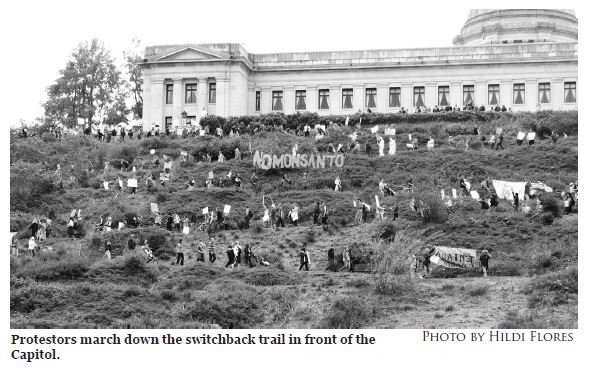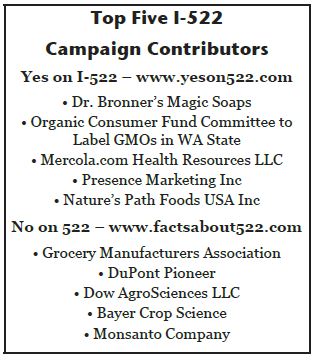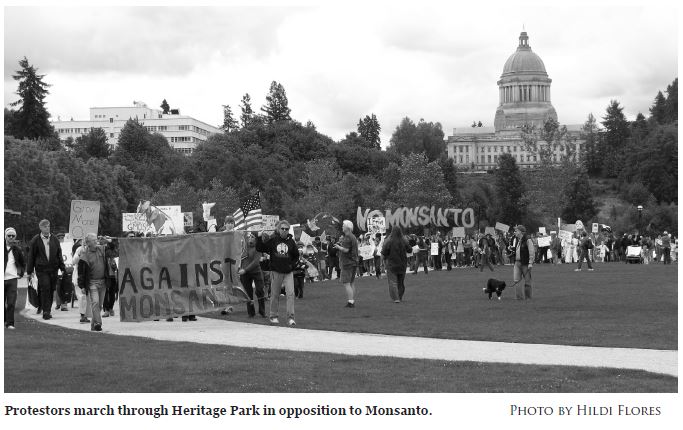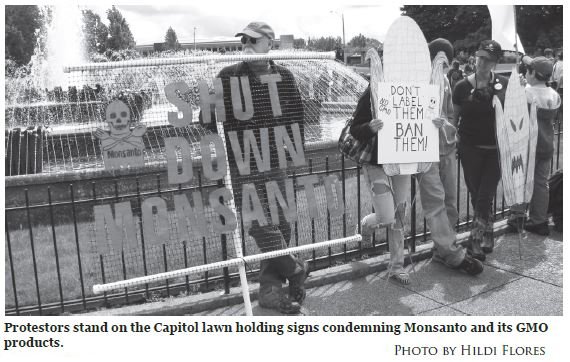Washington Wants to Know if It's GMOBy Hildi Flores
Just like any other high-stakes, polarizing issue, voters are being asked to discern the truth from two sides offering diametrically opposing information. In order to make an informed decision, voters may have to look past the information presented and consider who is behind the proponents and the opposition. Although I-522 is a state initiative, Washington has become a battleground for interests all over the nation, with much of the campaign financing on both sides coming from out of state. The focus of the I-522 campaign is on consumer awareness. In an interview for this article, Elizabeth Larter, a Seattle spokesperson for the campaign, said "it comes down to the shoppers' right to know what's in their food and to let individual shoppers make the decision based on the best information. Labeling provides the best opportunity for this."
Those in opposition to I-522 claim the initiative is misleading and would not be as effective as supporters are hoping. Label requirements would not apply to food in restaurants, nor would they specify what type of genetic engineering process was applied to the product. Opponents see the law as burdensome and unnecessary. As it stands, the USDA Organic label already ensures a product does not contain any genetically engineered ingredients, and a non-GMO label already exists which companies can voluntarily use. However, to suggest that a voluntary non-GMO label is the same as a mandatory label indicating the use of GM ingredients could be misleading, because consumers would be left guessing about products without a non-GMO label.
The Washington Association of Wheat Growers issued a formal statement against I-522 on their website, stating "there is no genetically modified wheat in commercial production in Washington State or elsewhere in the United States. We anticipate the introduction of [genetically modified] wheat is at least a decade away. The industry is pursuing genetic modification to grow more and better wheat with less impact on the environment, such as reducing chemical usage. Washington State University researchers are also looking for ways to enhance wheat through genetic modification to allow those with wheat intolerance or celiac disease to eat wheat." Although the absence of genetically modified wheat in the state is being used to suggest that labeling isn't necessary, it is clear from this statement that GM wheat production is in Washington's future. But I-522 gives those with concerns about genetically engineered ingredients a chance to act sooner than later by keeping consumers informed about such changes in food production. "Food companies are constantly relabeling," said Larter. "This is adding a couple of words and shouldn't cost shoppers more money."
Hildi Flores is a graduate of The Evergreen State College and serves as Managing Editor of the South Sound Green Pages and SPEECH Secretary.
Back to Home page. |

 In solidarity with a global day of resistance, an estimated 800 people from all over the South Sound marched on May 25 from the Capitol campus through downtown Olympia to oppose Monsanto. The chemical company has come under widespread scrutiny for its production of genetically modified organisms, otherwise known as GMOs. Washington State now lies at the heart of the GMO debate, as voters await the November ballot to decide whether or not food products containing GMOs should be labeled.
In solidarity with a global day of resistance, an estimated 800 people from all over the South Sound marched on May 25 from the Capitol campus through downtown Olympia to oppose Monsanto. The chemical company has come under widespread scrutiny for its production of genetically modified organisms, otherwise known as GMOs. Washington State now lies at the heart of the GMO debate, as voters await the November ballot to decide whether or not food products containing GMOs should be labeled.
 Larter went on to discuss the success of the campaign. She said that by organizing early, they have gathered over 350,000 signatures, which is the second highest signature gathering in state history. "The more we talk to people the more supportive they are. They identify and agree that they, as grocery shoppers, have a right to know what's in their food."
Larter went on to discuss the success of the campaign. She said that by organizing early, they have gathered over 350,000 signatures, which is the second highest signature gathering in state history. "The more we talk to people the more supportive they are. They identify and agree that they, as grocery shoppers, have a right to know what's in their food."
 Those who oppose the initiative also insist there is no evidence to suggest GMOs are harmful to human health and actually see them as a solution to some environmental and health problems.
Those who oppose the initiative also insist there is no evidence to suggest GMOs are harmful to human health and actually see them as a solution to some environmental and health problems.
 With such labels, consumers can do their own research to decide if the product is safe for human consumption.
With such labels, consumers can do their own research to decide if the product is safe for human consumption.